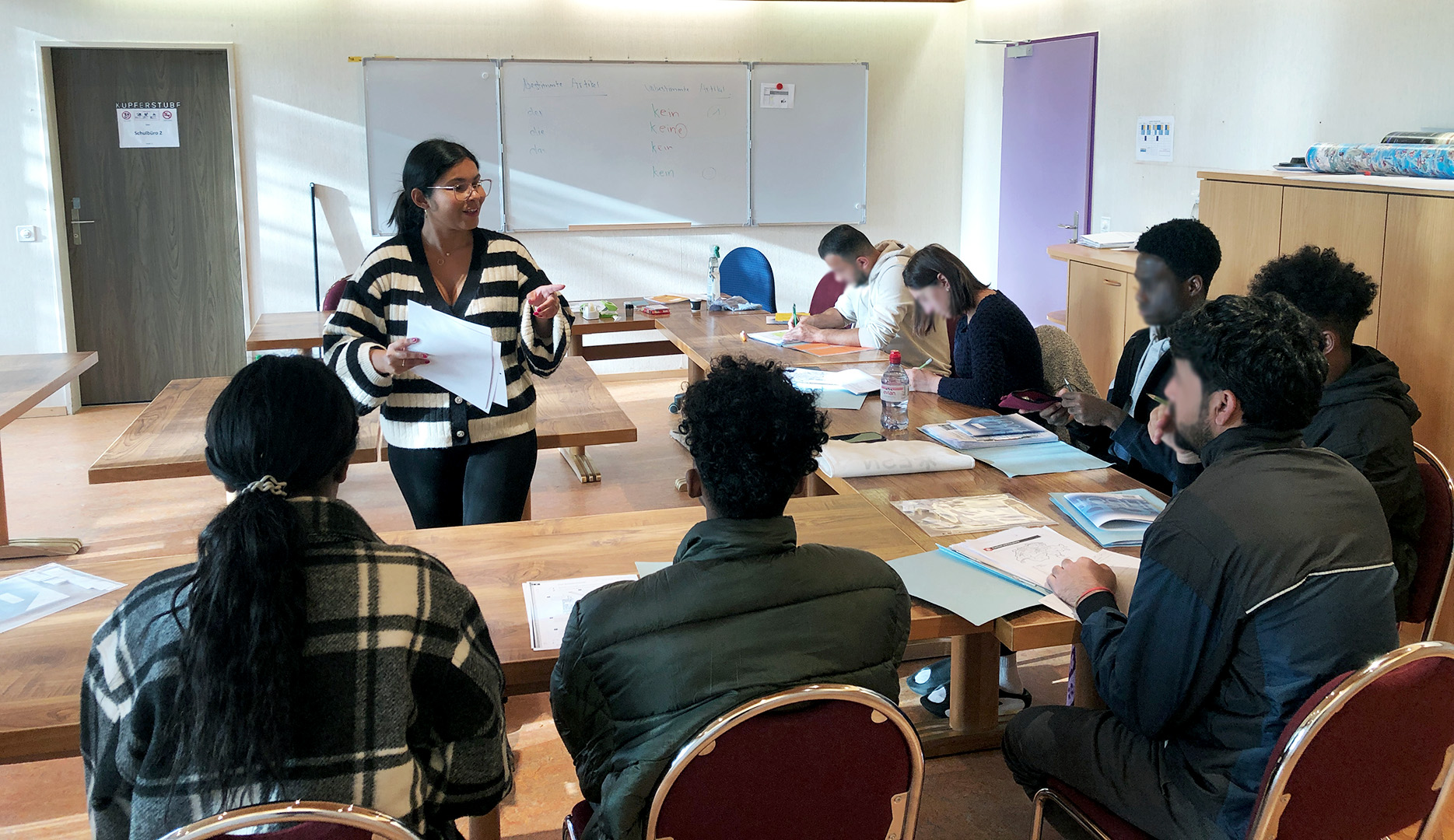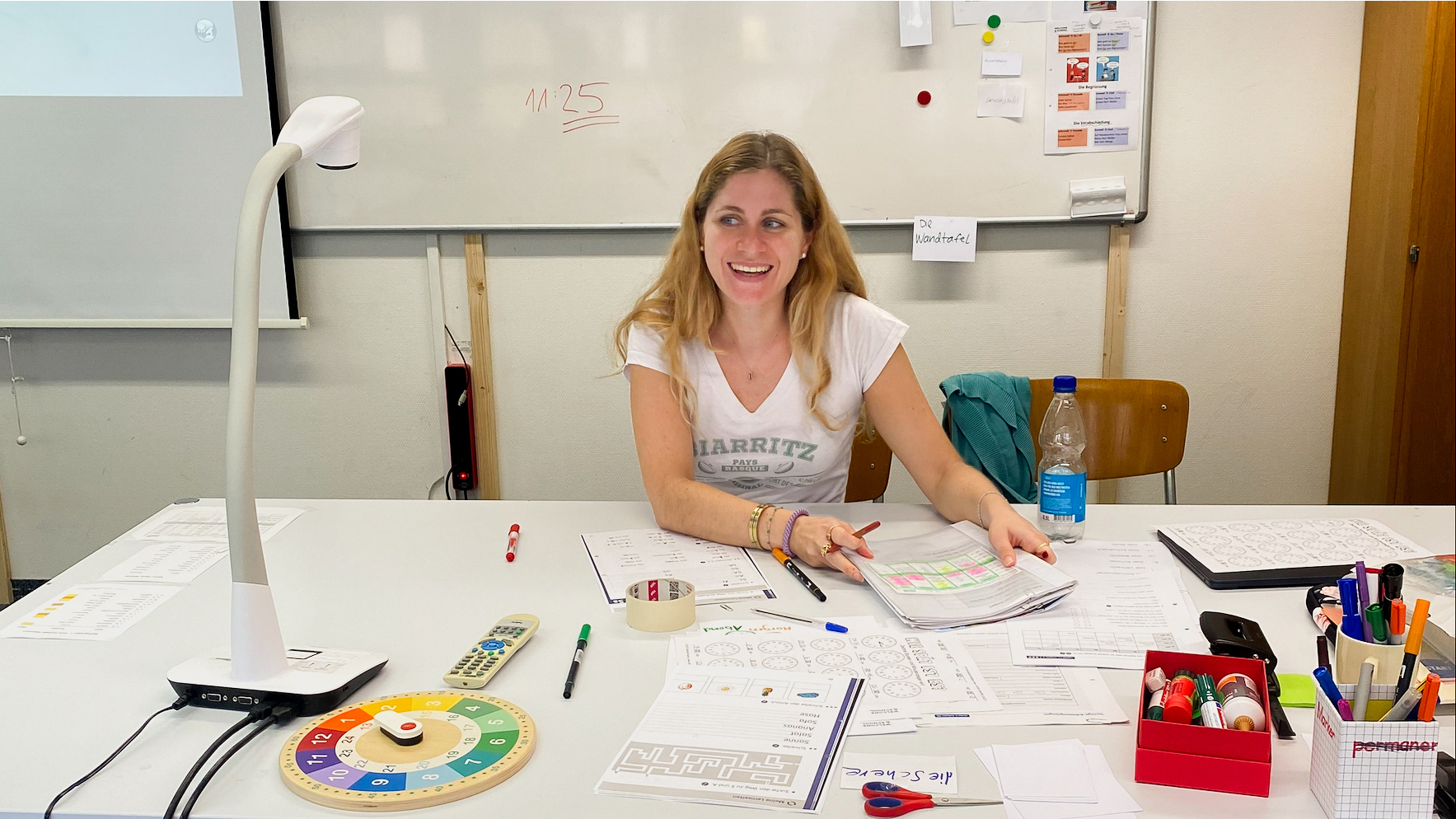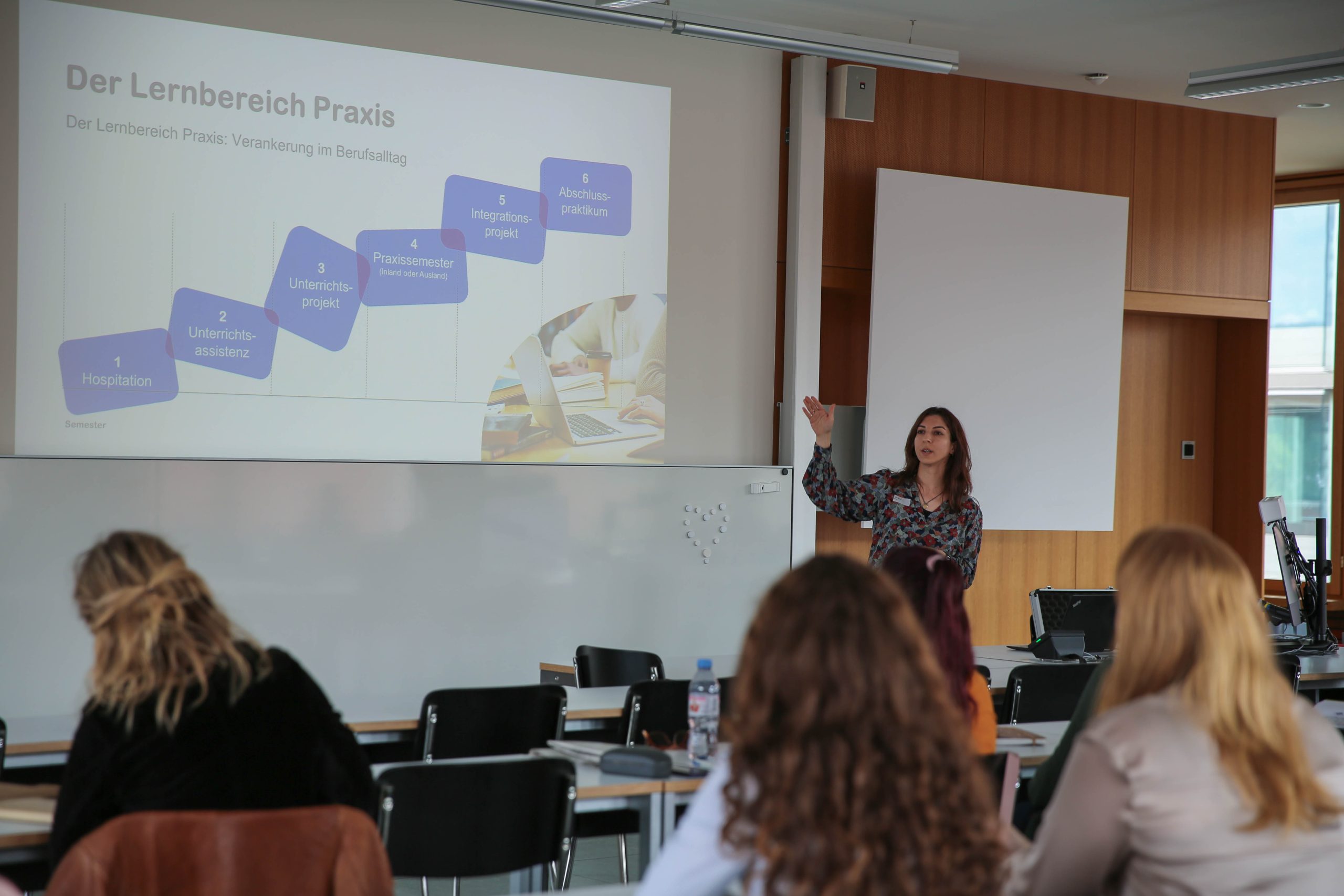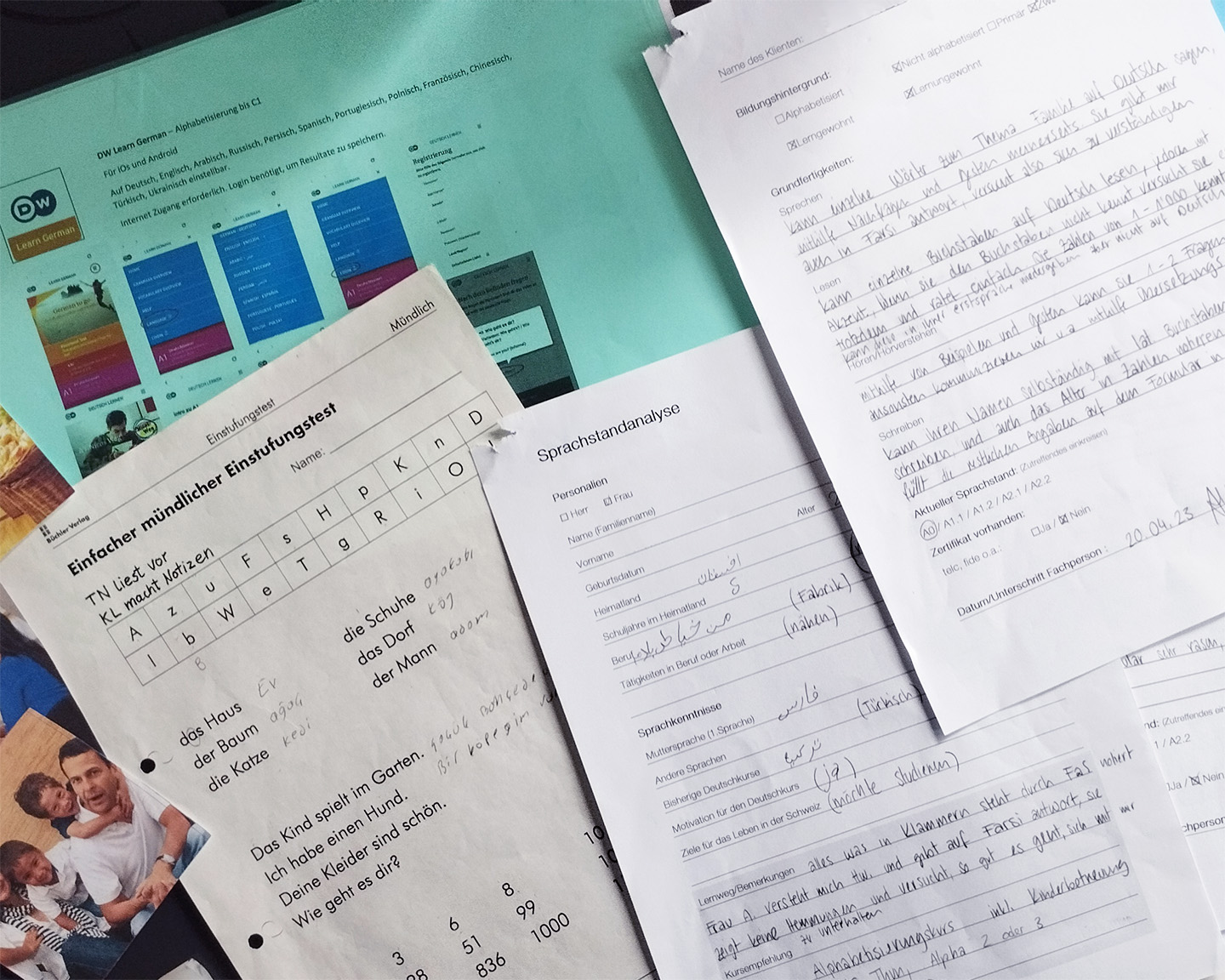BA in Language and Integration – German as a Foreign/Second Language
Language is key to participating in professional and social life. This degree programme provides you with the skills needed to perform effective and meaningful work with people from a wide range of cultures, allowing you to combine language and social engagement, shape the field of migration and integration in a professional and sustainable manner and teach German, an internationally important language, both at home and abroad.
Between migration and society, teaching and learning, language structures and language use: as a specialist in providing language support to adults, you will work with ambitious goals, in-depth knowledge and practical experience in an intercultural environment.
In the BA in Language and Integration, you acquire the linguistic and didactic knowledge necessary to assist non-native-speaking adults at home or abroad in developing their German skills and integrating at a professional and societal level.
Career
Whether teaching German, promoting communicative skills, developing teaching materials or heading up integration projects, the BA in Language and Integration opens up a plethora of career opportunities both at home and abroad, including at language schools, specialist agencies for migrants, government authorities, organisations and companies. With your in-depth specialist and practical knowledge, you will find yourself at the heart of social diversity and promote intercultural understanding on an equal footing.
What our graduates say
-

«Ich habe das Know-how, wie es richtig geht»
Jessica Stauffer, Absolventin des Bachelors Sprachliche Integration, ist nach dem Studium beruflich durchgestartet. Seit August 2023 leitet sie den Schulbereich in einer Asylunterkunft im Kanton ...
-

«Es ist genau das gewesen, was ich gesucht habe!» Der Weg in den Berufsalltag der sprachlichen Integration
Für Zoe Gisiger geht eine intensive und interessante Zeit an der ZHAW zu Ende. Sie gehört zu den ersten Studierenden, die den Studiengang «Sprachliche Integration – Deutsch als Fremd- und ...
-

Direkter Berufseinstieg nach dem Bachelor Sprachliche Integration
Zum ersten Mal schliessen in diesem Herbst Studierende das Studium «Sprachliche Integration – Deutsch als Fremd- und Zweitsprache» ab. Eine von ihnen ist Annik Broger, die sich mit ihrem Fachwissen im ...
Programme
In the BA in Language and Integration, you gain the skills to support adults in acquiring a new language and to both plan and shape projects in the field of integration. You acquire basic knowledge in the areas of language, didactics and project management as well as in connection with social and cultural issues in the area of migration/integration.
- Migration biographies
- Migration history and law
- Language diversity and policy
- Language and society
- Intercultural communication
- Migration and economy
- Insight into Arabic or Chinese
- Language acquisition and didactics
- Learning with (new) media
- Education management
- Language coaching and consulting
- Lesson observation
- Course planning and organisation
Further information about the degree programme can be found on our German-language websites:
About the BA in Language and Integration
Programme structure
Module overview
Practice-based elements
Admission
Costs
Registration for the information event
Application for the degree programme
Stories about the BA in Language and Integration and insights into what it is like to study on the programme can be found on Instagram and in our blog.
Study part-time
Would you like to combine your studies, career and family life? You can study the BA in Language and Integration flexibly by choosing to complete your studies via the fast track (three years), a medium-pace track (four years) or a slow track (five years). All variants can be completed on a part-time basis.
Specialisations
By choosing your specialisation, you expand your theoretical knowledge and deepen your specific practical professional skills on the basis of current scenarios from the professional world.
Language Consulting and Coaching
You familiarise yourself with various education and learning systems at home and abroad while also acquiring basic skills in the areas of coaching and intercultural communication. As a language coach, you support people on their learning journey and advise educational institutions on the topic of language support.
Language Education Management
You deepen your project management skills, learn the basics of education marketing and gain in-depth knowledge of the educational landscape and language support services in German-speaking Switzerland. You also address the economic factors of migration and integration.
Networking with practitioners
In many of our modules, you complete practical assignments at one of our partner organisations, allowing you to already lay the foundations for your own professional network during the study programme.
Insights into the degree programme
-

Praxisnah zum Ziel: Wie aus der Leidenschaft für Mensch und Sprache eine Karriere wird
In einer multikulturellen Gesellschaft wie der Schweiz ist die Sprache der Schlüssel zur Teilhabe am gesellschaftlichen Leben. Der Bachelor-Studiengang Sprachliche Integration bildet Expert:innen aus, ...
-

Slow, Medium oder Fast: Wie viel Flexibilität braucht dein Studium in Sprachlicher Integration?
Manchmal liegt es nicht drin, ein Vollzeit-Studium aufzunehmen. Die Familie, der Beruf, das Hobby und das Leben brauchen alle ihren Platz. Um die Vereinbarkeit all dieser Lebensaspekte zu fördern, ...
-

Mein Praktikum als Fachperson Sprachförderung
Das vierte Semester verbringen die Studierenden im Bachelor Sprachliche Integration ausser Haus, in der Praxis. Alice Schnell zog es zum Verein Asyl Berner Oberland, wo sie während fünf Monaten im ...
At a glance
Before the study
- Download: fact sheet(PDF 117,6 KB)
- Application deadline: 30 April
- Tuition fees: CHF 720 per semester + additional course-related expenses
During the study
- Programme start: autumn
- Location: Winterthur
- Number of credits: 180 ECTS credits
- Duration: 6 to 10 semesters (depending on the study model)
- Legal basis: academic regulations and annex
After the study
- Title: Bachelor of Arts ZHAW in Language and Integration – German as a Foreign/Second Language
- Graduate programmes: Master of Arts in Applied Linguistics and others
Admission
Admission requirements
To be admitted for enrolment in this programme, you will need to meet the following requirements:
- Present either a Swiss higher secondary education certificate (Matura) – which may be either a Swiss general baccalaureate (in German, “gymnasiale Maturität”), a Swiss specialist baccalaureate (in German, “Fachmaturität”), a Swiss vocational baccalaureate (in German, “Berufsmaturität”) – or a Swiss or foreign equivalent qualification
- A successful result in our aptitude test
You are not required to demonstrate practical professional experience (e.g. a year of work experience) in order to be admitted to the BA in Language and Integration.
Personal qualities / aptitude test
In addition to the formal admission requirements, an interest in language(s) and issues such as migration, mobility and internationalisation as well as a desire to work together with people in an intercultural environment are key to achieving success both during the study programme and later in the professional world. Before each course of study, we therefore carry out an aptitude assessment, which forms the basis for your definitive admission to the programme.
Dates and deadlines
The final date for applications is 30 April. Aptitude tests are held between mid-January and the beginning of June. The degree programme begins in calendar week 38.
Regular degree programme at the ZHAW with a foreign university entrance qualification
If you have gained a foreign qualification either abroad or in Switzerland which allows you access to higher education (e.g. Abitur or International Baccalaureate), please submit the documents requested by the academic office responsible for the degree programme you have chosen so that your qualification can be checked for equivalency. This equivalency recognition process follows the Guidelines on Equivalency Recognition for Bachelor’s Degree Programmes and takes place after your application has been submitted. If you have any questions, please contact the academic office. There are no quotas on students from other countries.